Castles & Christmas
My Inspirational Story for December. Merry Christmas, Happy Hanukkah and Happy Holidays to Everyone!
One-time or recurring donations can now be made at: KO-FI
This is my inspirational essay for December. These essays are usually for my paid subscribers, but it’s Christmas and I want everyone to enjoy this little holiday story. Thank you for joining me on this wonderful writing journey. My heart is filled with gratitude!
I will get the hard part over first. On Sunday night, my sons’ father, Walter, passed away. He had been horribly ill for a long time and although it was sad, I felt a sense of relief that his suffering was over. It was the same with my sister, who had been ill with cancer for many years. When the time came to say good-bye, I was thankful that she would no longer be in pain.
There are so many tragedies associated with Walter’s life, while at the same time, so many wonderful memories as well. Memories of when we were married, when our children were young. At a certain point, Walter began to change and became increasingly paranoid about small things. We didn’t know what was wrong with him. It was only much later, after he had divorced me, remarried and then became isolated from family and friends, that we found out he had Alzheimer’s. It was unbearably difficult for my sons to see how his mind had slowly been taken from him. But at least it helped us all to understand why he’d behaved in such a strange manner all those years earlier.
A similar thing happened to my dad towards the end of his life. Dementia. Such a brilliant mind and then it started to fail. My sister stayed sharp until the end. Over the course of her illness, she asked me many times to please not forget the stories of our childhood and to retell them. I did my best to keep my promise to her.
There were so many fascinating stories with Walter as well. He came from an old California real estate family. His great grandmother, Lillian, had been a Zeigfield Follies girl and once she married the first Walter, she gave it up and wrote a column for the Los Angeles Times. His mother, Joyce, was an actress who was being groomed by MGM studios to be a star when she met Walter “Tim” Leimert II. She was one of the original Jane’s in the Tarzan movies and she kissed Gary Cooper in High Noon.
Howard Hughs took her on a date in his airplane (a very strange man, she said) and Marilyn Monroe lived in the same bungalow as she did when they were first starting out in their acting careers. I loved hearing the stories Joyce told me about her acting days. She spoke with nostalgia about her independence and how she had her own little car. The Leimert men had a history of marrying artistic women and divorcing them after the children came along. I met the same fate as Lillian and Joyce.
Marilyn Monroe had her last photo shoot with George Barris in 1962 at my father-in-law’s Hollywood Hills home. She, too, didn’t fair very well with men.
I’m thankful I now have the opportunity to keep these stories alive. By interweaving some of them into my essays, along with current events, my readers can be reminded of how much our stories matter, so much more than the stories we are now being force-fed by mass media and corporations that seek to overtake our brains. The tech/media masters want us to forget our pasts, our histories, and what it means to be human. They want our children to forget the stories of their parents and their ancestors. Or, at the very least, to treat them with derision. By the time our great grandchildren are teenagers, it is sad to contemplate that they might never have experienced, even in a story, what it is like to have free minds, without machines constantly feeding them stimulation.
A few years ago, I took my daughter and my niece to visit the castle I lived in when I was a child. By the time we made that trip, my sister had been gone for a few years. I was able to share the stories of our childhood adventures with my daughter and my niece, in the magical place where they actually happened.
Here’s a Christmas story that I told to them.
When I was a child, my family lived in a castle. Yes, a real 17th century castle in a village called Echandens, just above Lausanne, Switzerland.
We rented the third floor, arriving in the fall of 1966. I was 10 years old. My sister, Janna, was 12. My brother, David, was 14 and Jon was 7, but they don’t come into this story.
Living in a castle with turrets and dungeons—that we were told we should never, under any circumstances enter—and paintings of nobility whose eyes followed you across the room, winding staircases and hidden passageways, well, it was too wonderful—as if we had entered a marvelous fairytale and we were a part of it.
A funny old lady named Madame Franco owned the castle and she lived in the main tower. She was very proud to inform us that she was related to the General Franco of Spain. Her grown-up son, Guido, was always hanging around and seemed quite sinister. He was tall and skinny and reminded us of a wanna-be Hollywood film director, with his dark glasses, beret, and ever-present cigarette. There was a shed on the castle grounds where he spent a lot of time. What did he do in there, we wondered?
A Canadian family lived on the ground floor. They had a Swiss nanny who looked like Bridget Bardot. She was high-strung and one night started screaming hysterically that a peeping Tom was looking in her window. Of course, we suspected Guido.
That Christmas, the castle and the village was transformed into a winter wonderland. At night, I loved tiptoeing into one of the small turrets and staring out at the moon and the stars and the glittering snow below. Years later, I would put that magic into the story and artwork of Christmas at Rumpole Mansion, sadly out of print now. To this day, people contact me to say how they used to read these books to their children and now they read them to their grandchildren.
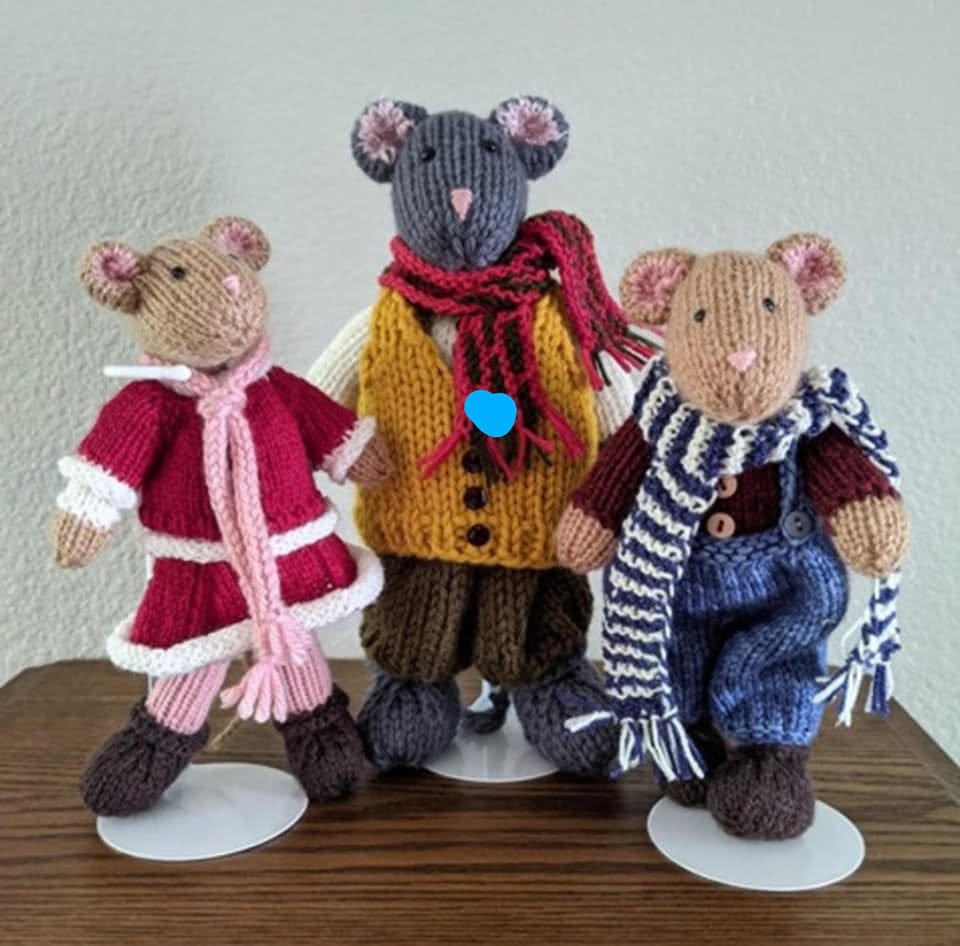
Janna and I played in a small forest near the castle. We discovered the forest in late autumn. The trees were almost bare, just a few bright spots of orange and red clinging here and there, the rest a carpet of rich color on the ground. Rubbery mushrooms peeked out, damp dark earth and slippery mossy patches in between. A tiny stream danced and chattered through the middle of the forest, an array of rocks and stones strewn across its path.
Taking it all in, our first conversation went something like this.
“We’re going to name everything in the forest,” Janna declared.
It was a marvelous idea. There was no doubt that it was a magical place filled with fairies and dwarfs and all manner of fantastical creatures.
“At the full moon, the fairies dance, here in the glen,” said Janna. “So, we’ll name it Fairies Glen.”
Dug into a steep bank above the stream was a dark opening. Knotted roots grew above it, making it look almost as if it was a carved entrance of a doorway.
“That’s where the witch Dresella lives, so we’ll call this Dresella’s Cave. She wants to kidnap the fairy princess, Lillia, and keep her captive. We have to make sure that doesn’t happen.”
“How?” I asked.
“For starters, just by being here,” said Janna impatiently. “Dresella knows we’re watching her.”
I glanced around nervously. “It seems more like she’s watching us.”
“Well, don’t worry. The fairies will protect us. Just stick with me.”
“And do what?”
“Karen! I’m going to talk to the fairies and then we’ll have a better idea of what we can actually do, okay? Honestly, anyone would think you were an idiot.”
“Where do the fairies live, where are they now?” I asked, looking around.
“They live in the trees, they’re Tree Fairies.” \
I looked up.
Janna sighed. “You can’t see them. They’re invisible to ordinary people. But they’re there. I can see them, not right now, but sometimes I can.”
“How?”
Janna tried to look modest but failed. “They let me. It’s the first time they’ve ever trusted a human. I help them. I bring them supplies, warn them when people are coming from the outside world. That sort of thing. Once, they let me join them at the engagement party of Lillia to the fairy prince Rothgard. He’s a water fairy you know, and lives by Lake Geneva.”
I couldn’t contain my jealousy. “That’s not fair! Tell me about the party!”
“Lillia was dressed in a gown of purest white, her long blond hair woven with flowers. Rothgard was strong and handsome (of course), his long dark hair held back with green vines.”
“Long hair?” I asked.
“Elfen men have long hair, just like hippies, only cleaner. Anyway, just as they were dancing, Dresella and her nightmarish ogres and weirs appeared and almost stole the princess away. We barely managed to fight them off. But she’ll be back with a bigger army, and we have to be prepared.”
“How about me?” I cried. “What can I do? Why didn't you take me along?”
“Shh!” she said severely. “Don’t talk like that here. They’re listening. They don’t like dissension. Just be thankful I brought you and I’m telling you all this secret stuff. They said I could. They’re trying to decide if you can be trusted. If they do, then next time, I can bring you along. So shut up and be thankful!”
“I’m sorry!” I cried. “I can be trusted! Oh please, I really want to meet them. I'd rather die than betray them. You know that!”
“Look, this isn’t a game, Karen, it’s real. Once you align yourself with the fairies, you become the enemy of Dresella. It’s dangerous. You sure you want that responsibility?”
“Yes!” My whole being said the words.
Janna nodded, satisfied. “Okay, we’ll see what we can do. Now, we can’t forget about the dwarfs. Because of course, there are dwarfs. See this rock here?” Janna pointed to a big gray boulder on the other side of the glen where the trees grew more closely together than any other part of the forest. “That’s the secret door to the dwarfs’ underground home. In there they forge their weapons made of the finest metal. They have an uneasy alliance with the fairies against the witch and her army. But it’s in danger of collapsing because really, fairies and dwarfs don’t ordinarily get along.”
“Where’s the door?” I asked, staring hard at the rock. I wanted to see the door. I wanted to open it and go inside.
Janna spoke slowly as if to a three-year-old. “Karen, how many times do I have to tell you, just like everything else right now, you…can’t…see…it. But at night, when the moon and stars come out, that’s when the forest comes alive.”
We stood still for a moment, imagining the night. It seemed that the stream quieted its chatter, the birds stopped their chirping and the squirrels paused in their search for nuts, almost as if the forest, too, was listening for the sound of the fairies’ singing and then the clash of weapons; for some lingering memory of the engagement party that had almost gone so terribly wrong.
A mist crept up from the ground and swirled about our feet. The air grew fiercely cold. The entrance to Dresella’s cave looked like a yawning mouth and I imagined I saw something glittering inside. Two eyes?
“Let’s go home,” I said, shivering.
As we walked back to the castle Janna said, “Okay, I think it’s time I told you everything.” And my heart leaped, wondering what new excitement was in store for me.
“The fairy king, Clairven, has told me that long ago a dragon stole a fabulous fairy treasure, a giant diamond of great power, and hid it beneath the castle—our castle—in its lair. The dragon has long since been killed but no one has ever found the lair or the diamond. A spell was cast around the castle keeping the forest creatures out—even Dresella can’t come near the castle.”
“Thank goodness,” I said fervently.
Janna nodded. “Yeah, except that she has an ally—Madame Franco’s son, Guido.”
I gasped. “No!”
“Yes! He’s looking for the lair and if he finds it, he’ll give the diamond to Dresella and in return she’s promised to give him powers and make him the most famous movie director in the world. If that happens, all will be lost.”
I wasn’t sure what she meant would be worse—Guido’s horrific movies influencing the world or Dresella controlling the diamond’s power. “What can we do?”
Janna turned to me and grabbed my arm. Her face was earnest. “We must find the lair and take the diamond back to the fairies before it’s too late.”
An icy rain had begun to fall, and we hurried on. We were out of the forest now and above us on the hill could be seen the castle, the ghostly mist creeping towards it like Dresella’s claws, grasping, searching, clinging to the walls, snaking up and over into the castle grounds. It began to snow, the first snow of the winter and we hurried faster, the castle towers and slatted rooftops looking forbidding in the leaden sky.
We climbed over the castle wall and into the backyard.
“Wait!” cried Janna, steering me behind a scraggly bush. We peeked out and I saw Guido, walking along the little path to the mysterious shed where he usually went in the late afternoon and stayed until the wee hours of the morning, at least we assumed. He wore his signature black beret, and even on this dark, snowy afternoon, the dark glasses that never left his face. In his arms he held a big brown box.
“What’s he doing?” I whispered.
“I don’t know.”
We waited until he was inside, and the door had shut before venturing out from the safety of our hiding place. Then, we ran and didn’t stop until we were around the other side of the castle into the courtyard and had opened the big wooden door to the central tower. Once inside, we stopped for a moment, breathing heavily before running up the winding stairs to the safety of our third-floor home.
Of course, we made up a story about the package. The diamond was inside. Guido had stolen it. Naturally, the diamond remained forever illusive. We left the castle in the spring, traveling through Spain and across the Mediterranean to Morocco. I write about that adventure in my essay The Bloodsuckers, how Janna bought an old lamp and I bought a glass bottle in the Fes Medina, sure that they contained genies that we could set free and command.
Somehow, the fairies and the genies eluded us. We never discovered what Guido was really up to in that shed or who was spying on the nanny. It didn’t matter. Our minds were filled with colorful pictures that we created with our own imaginations. Every night when I went to bed, I dreamed of the stories we made up and, in the morning, I wondered what we would discover that day. Boredom was unknown. If we weren’t making up stories, we were lying on our beds and reading them. That year, I read among other books, all the Narnia Chronicles, Wind in the Willows, and the Enid Blyton Malory Towers series. English boarding school seemed like the most wonderful place on earth.
I still have my copy of Merely Belinda that I found in a village bookstore somewhere in England. It was already old and frayed when I bought it, so you can imagine what it looks like now. The story is about the daughter of a famous American film star who comes to school in Dorset under an assumed name and gets kidnapped. I read that book more than once while storms beat against the castle shutters, lying on my bed and eating toffees that I bought at the village store.
This Christmas, remember your stories. No, not all of them are magical or beautiful. Some are tragic. But we can always find something wonderful if we open our hearts and our eyes. Share your stories with your children and your grandchildren. Don’t let the machines take over with their dazzling displays that have no substance beneath the glitter. Find the beauty, even in the sorrow, and keep it alive for generations to come.




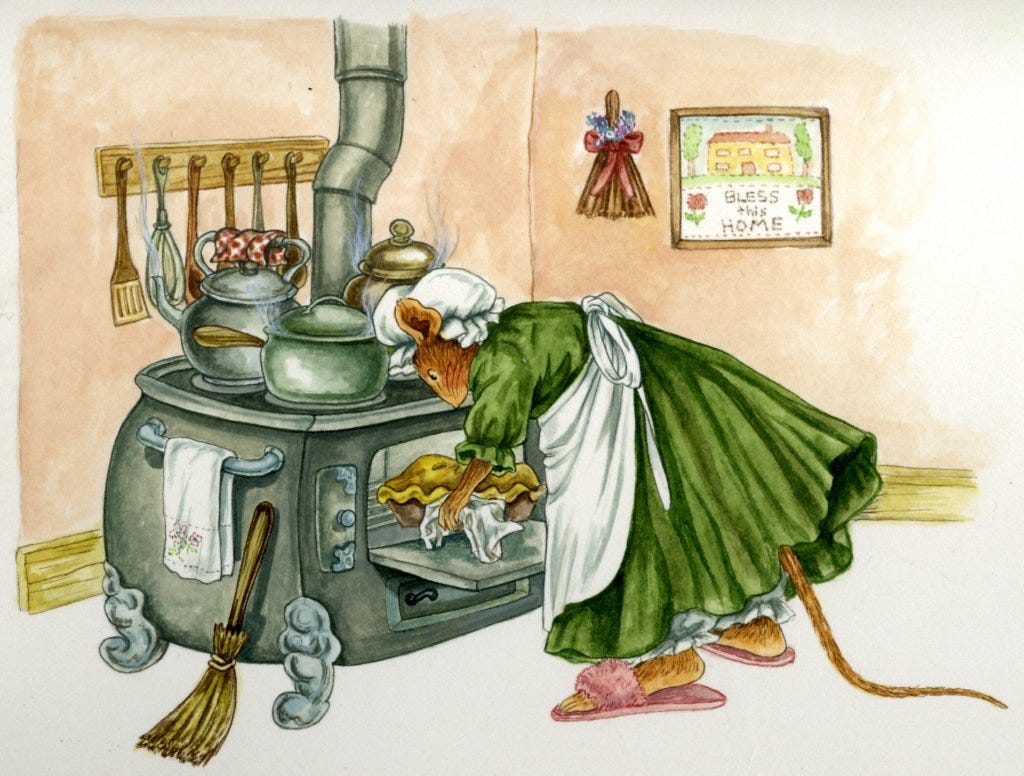

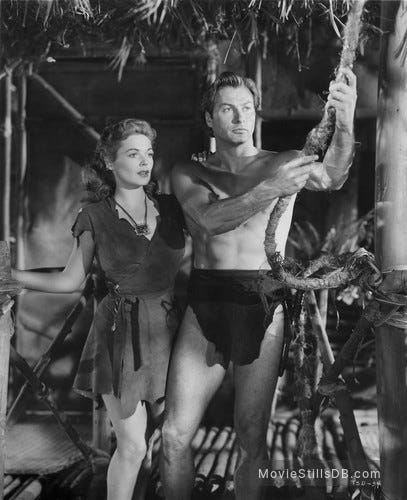
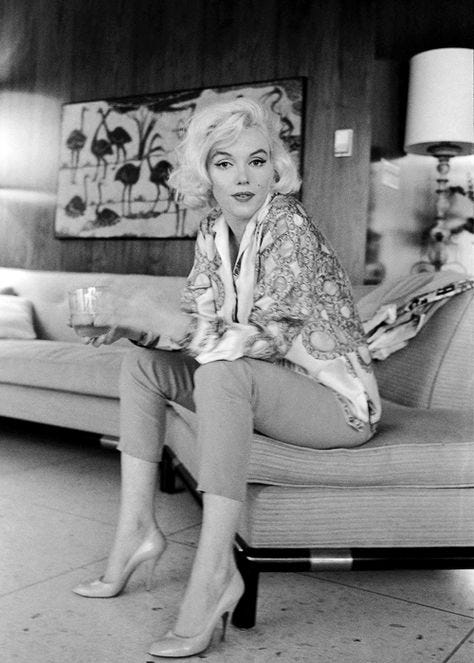
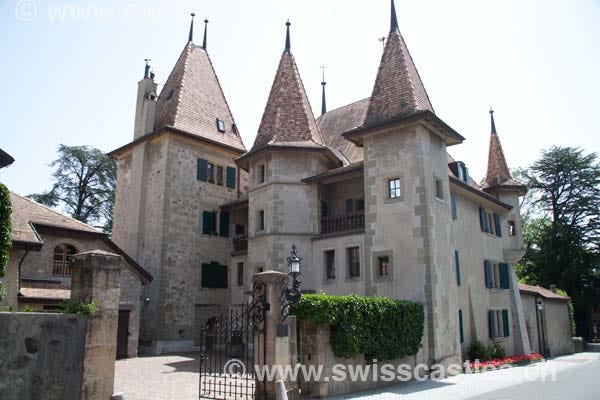
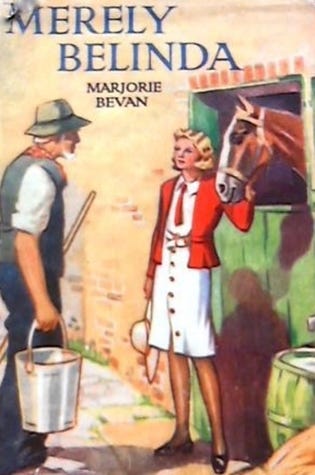
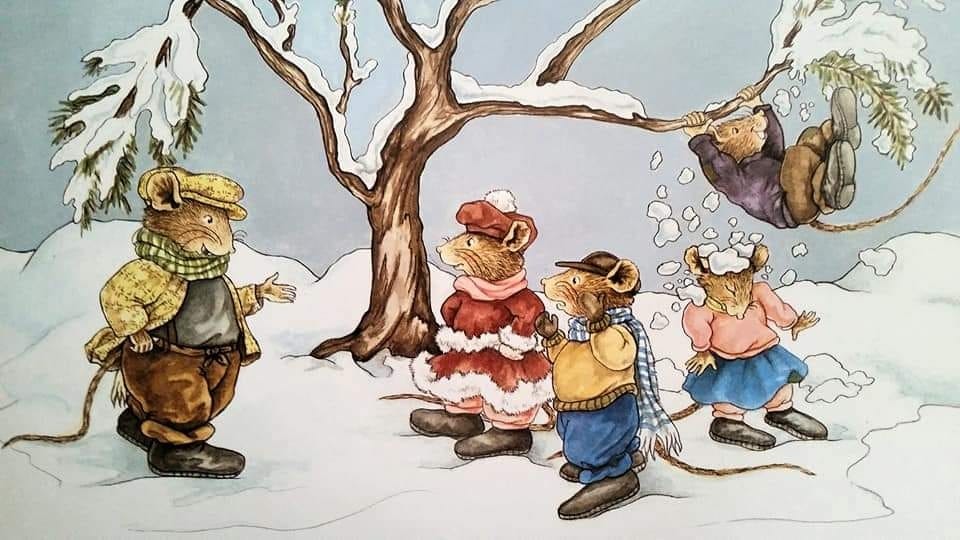
Thank you Karen. This is so beautiful, and so human.
"Elfen men have long hair, just like hippies, only cleaner." I love your sister!
Merry Christmas, thank you for the paintings, you know, they're my favorite.